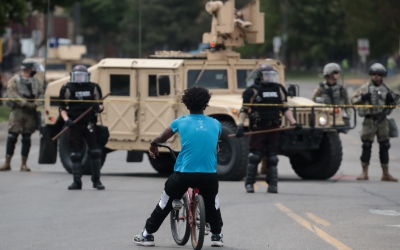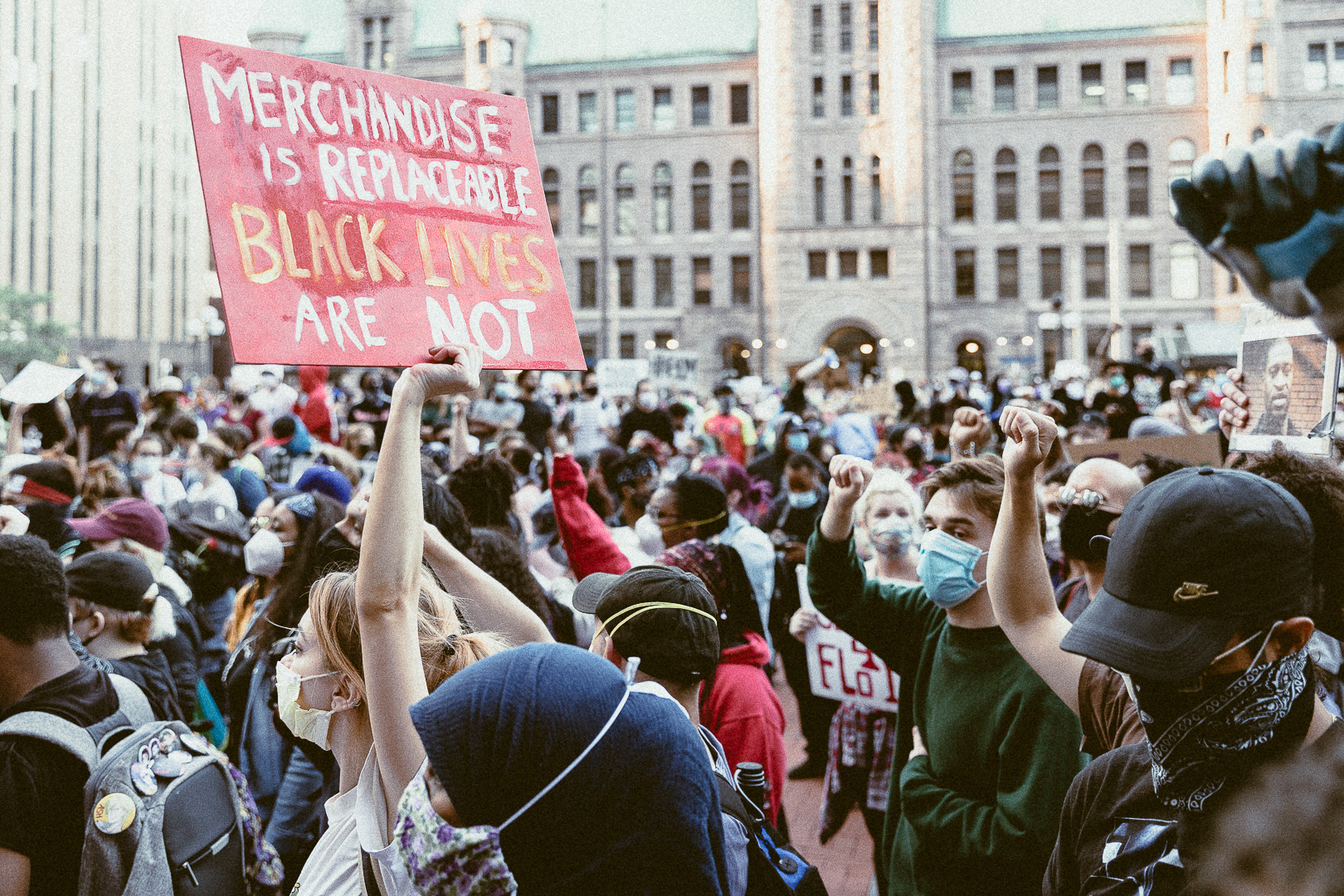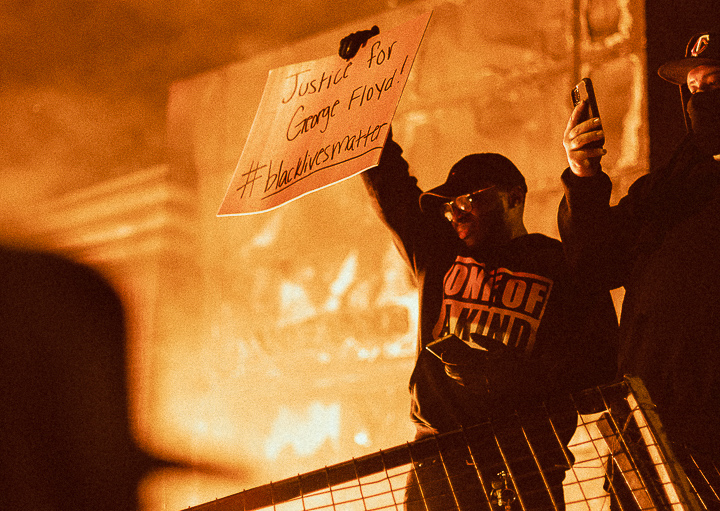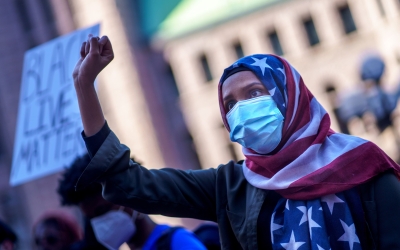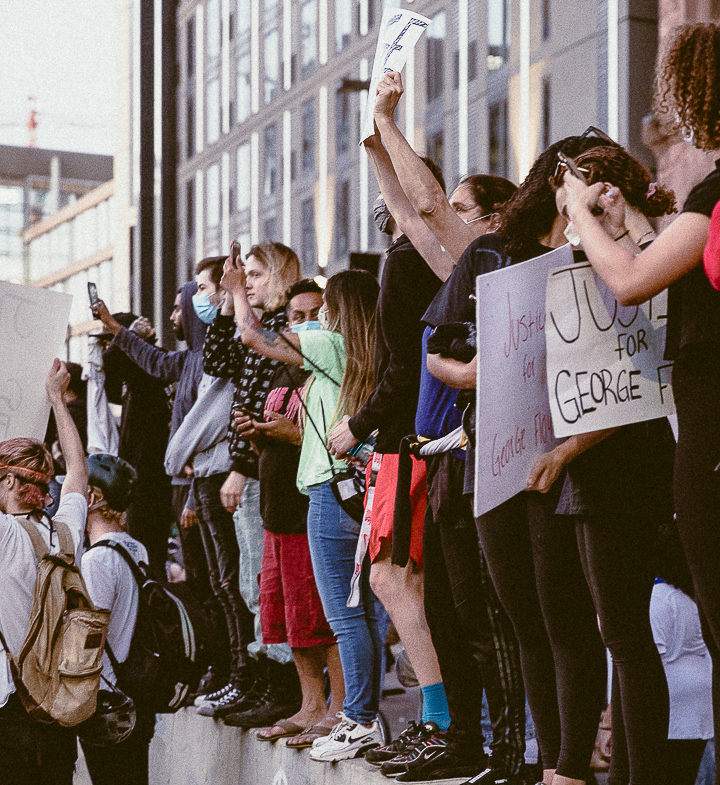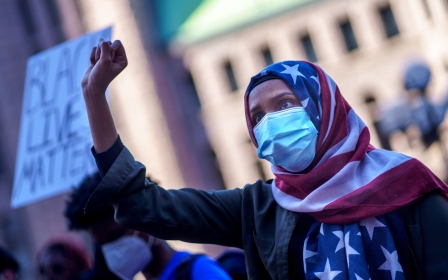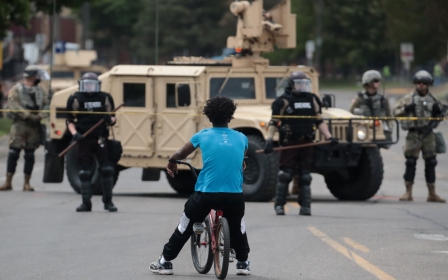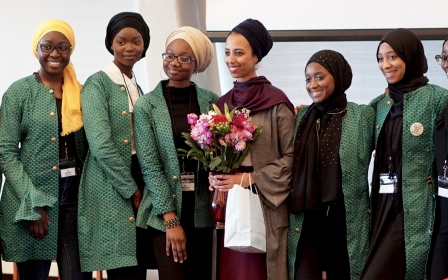Black pain is ours: Minneapolis Somali community rallies over Floyd killing
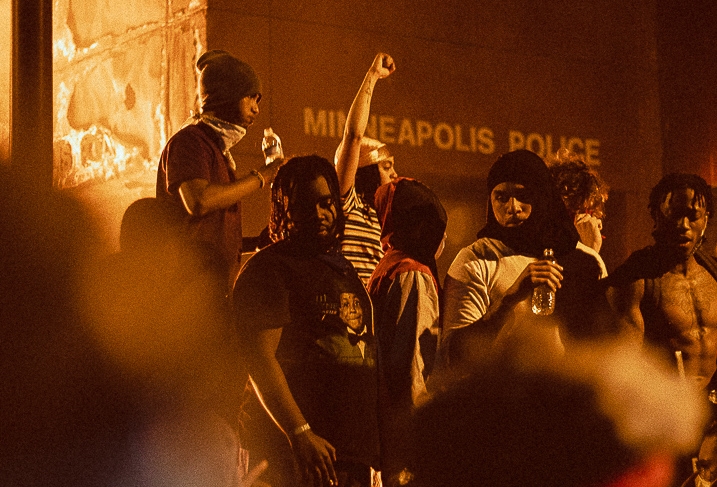
In the aftermath of the death of George Floyd, an unarmed Black man killed by a police officer who kneeled onto his neck while arresting him for a nonviolent crime, outrage in the community of south Minneapolis has boiled over into the angry demonstrations seen this past week.
The killing has also caused some friction between the Black and Muslim communities, because Cup Foods, where a store employee called the police on Floyd to report a $20 counterfeit bill, is owned by a Muslim-Arab man.
'It came from a Muslim business who couldn't give this guy the benefit of the doubt. It's heartbreaking'
- Khadija Ali, Somali American photographer
"Out of all the police brutality situations that I have been involved in or was aware of, or have been alive to witness, I think this one hits very close to home because it did come from my community," said Khadija Ali, a Somali-American photographer and demonstrator.
"It came from a Muslim business who couldn't give this guy the benefit of the doubt. It's heartbreaking," Ali told Middle East Eye.
The store owner unequivocally condemned the killing and showed support for the Black Lives Matter movement, saying that his employee was simply following protocol as dictated by federal guidelines.
New MEE newsletter: Jerusalem Dispatch
Sign up to get the latest insights and analysis on Israel-Palestine, alongside Turkey Unpacked and other MEE newsletters
Still, many activists and community members have said the killing opened the door for a conversation about racism and anti-Blackness within the larger Muslim community.
Within this dialogue, and the accompanying outrage and frustration, lies the Somali American community, which plays the unique role of being visibly Black and also Muslim.
Sharing the pain
Multiple organised protests have taken place in recent days throughout Minneapolis, coupled with other angry spontaneous rallies.
While made up mostly Black Americans, other minority groups and white people as well have joined the Minneapolis rallies, facing tear gas and other riot weapons used by the police.
Young Somali Americans have come out to the demonstrations in droves, pouring out their anger and frustration with what they see as a broken criminal justice system.
One viral video shows a Somali girl kicking back a tear gas canister thrown by police in riot gear.
"I can't take the pain for the Black African Americans who were born here," said local activist Asma Jama. "They have pain that is different from ours, right? But at the end of the day, we have the same skin colour," she told MEE.
"And now, we are going through the same thing they're going through," she added.
The area around the location where Floyd was killed includes many Somalis and their businesses.
"That whole neighbourhood is Somali businesses, stores, restaurants and all of that," said Anisa Mohamad, a member of the Somali community in Minneapolis.
Ali, the Somali-American photographer, said the area is "our community. It's our neighbourhood."
"It's beautiful to see a lot of Somalis come out," Ali told MEE. "I think, because in Minneapolis, especially where it happened, that's pretty much where the majority of the Minnesota Somali population lives."
Ali herself has been out every night at the protests, documenting with her camera. She noted the large number of Somali Americans participating in the demonstrations alongside the African-American community.
"I think they are playing an integral role in this protest," she said.
Black and Muslim
Minneapolis hosts a large Somali-American community, the biggest Somali diaspora group in the United States, according to the American Community survey in 2017.
They began coming to the US as early as the 1980s, but more emigrated in the 1990s to escape a civil war in Somalia.
Somalis began resettling in Minneapolis after securing jobs at meat-packaging plants, and have since opened businesses and established deep roots in the city.
Ali said that the community has since struggled with its identity, as many of the older generation are averse to being considered Black Americans.
Still, most of the younger Somalis who grew up in the US have aligned themselves with the Black Lives Matter movement, especially after witnessing discrimination and racism at the hands of law enforcement, she said.
Being seen as both Black and Muslim, Minneapolis resident Haji Yussuf said, sometimes means facing multiple forms of discrimination.
"Somalis are Black. So, a white cop or a bad cop doesn't really see a difference. He sees Black, and then when he hears the name, the racism is even more pronounced," said Yussuf, who ran for Congress before dropping out and endorsing eventual winner Congresswoman Ilhan Omar.
Yussuf also runs a multilingual media company, through which he is documenting the ongoing protests.
Anti-Blackness in Muslim community
Through this multidimensional lens, the Somali community has also experienced anti-Blackness that is prevalent within the larger Muslim community.
Black Muslims have long felt marginalised in communities predominantly made up of immigrant Muslims and white converts.
'If you want to be part of the revolution, we as Muslims have to sit down and understand that we have the problem too'
- Asma Jama, local activist
"I think because of what happened, a lot of people are looking to the Arab-Muslim population and saying, 'Hey, you know, you really do need to address these issues within our communities'," Ali said.
The problem of anti-Blackness exists in the Somali community as well, with the older generation not identifying as Black.
"It's not just the Arab community, I think a lot of us in the Muslim community period, and it's, this is just as relevant to Somali people," Ali said. "We don't have these conversations about race."
The young activist Jama told MEE how even engaging with elders in the Somali community has not been enough to eradicate racism and prejudice.
"It's a fight that everybody has to look inside themselves and realise that what is happening now is a revolution," Jama said.
"If we want to be part of that revolution, we as Muslims have to sit down and understand that we have the problem too."
Ali said she was proud to see Somali businesses supporting the demonstrations, donating food and supplies to help protesters survive.
If you see one eating a banana, she said, there's a good chance it was donated by a Somali business. "Somalis are known for their bananas," Ali said, chuckling.
What comes next?
On Friday, Hennepin County Attorney Mike Freeman announced that the ex-police officer who killed Floyd, Derrick Chauven, had been arrested and charged with third-degree murder and manslaughter.
Still, many in the community said it was not enough, demanding that the other three officers on the scene also be charged. They continued to protest.
Ilhan Omar, the Somali-American congresswoman who represents the district where Floyd was killed, on Friday introduced a resolution alongside Black Congresswoman Ayanna Pressley condemning police brutality, racial profiling and the excessive use of force by law enforcement.
"From slavery to lynching to Jim Crow, Black people in this country have been brutalised and dehumanised for centuries," Omar said in a statement.
'I'm lost for words, I don't know what we're gonna do, how it's gonna work, but I feel that this is a revolution'
- Asma Jama, local activist
"The war on drugs, mass criminalisation, and increasingly militarised police forces have led to the targeting, torture and murder of countless Americans, disproportionately black and brown.
"The murder of George Floyd in my district is not a one-off event."
Jama said that Floyd's killing has opened a Pandora's box of difficult conversations communities must have, conversations that include how to finally deal with systemic and institutionalised oppression, criminal justice reform and police brutality.
Jama added that while she does not presently have expectations of proper criminal justice reform, she does hope that the demonstrations will bring about positive change for the Minneapolis community.
"I'm lost for words, I don't know what we're gonna do, how it's gonna work, but I feel that this is a revolution," she said.
*Some names in this story have been altered in order to protect the identity of the protesters.
Middle East Eye delivers independent and unrivalled coverage and analysis of the Middle East, North Africa and beyond. To learn more about republishing this content and the associated fees, please fill out this form. More about MEE can be found here.


